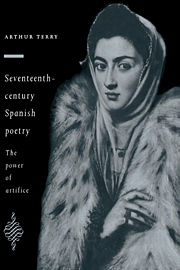Book contents
- Frontmatter
- Contents
- Preface
- List of abbreviations
- 1 The inheritance
- 2 Theory and practice
- 3 Luis de Góngora: the poetry of transformation
- 4 Lope de Vega: re-writing a life
- 5 Between two centuries: from Medrano to Valdivielso
- 6 Francisco de Quevedo: the force of eloquence
- 7 The literary epic
- 8 Plenitude and decline: from Villamediana to the second half of the century
- 9 Sor Juana Inés de la Cruz: the end of a tradition
- Epilogue
- Notes
- Select bibliography
- Index
9 - Sor Juana Inés de la Cruz: the end of a tradition
Published online by Cambridge University Press: 01 October 2009
- Frontmatter
- Contents
- Preface
- List of abbreviations
- 1 The inheritance
- 2 Theory and practice
- 3 Luis de Góngora: the poetry of transformation
- 4 Lope de Vega: re-writing a life
- 5 Between two centuries: from Medrano to Valdivielso
- 6 Francisco de Quevedo: the force of eloquence
- 7 The literary epic
- 8 Plenitude and decline: from Villamediana to the second half of the century
- 9 Sor Juana Inés de la Cruz: the end of a tradition
- Epilogue
- Notes
- Select bibliography
- Index
Summary
Though the best poetry of the second half of the century is by no means negligible, the general impression is one of diminished possibilities, reinforced by the absence of any major talent. As well as this, there is a growing sense of fragmentation and dispersal: several of the most interesting poets of the period, as we have seen, are exiles, and in Spain itself, the kind of cohesion represented by the literary academies of the first half of the century and by the patronage of cultured politicians like Olivares has been largely lost. All this seems to point to the decline of a whole poetic tradition, one which, despite its former greatness, now appears to be reaching inevitable extinction. Again, however, one must be careful not to oversimplify: if the Spanish poets of the time were unable to renew the tradition in any significant way, the sense in which this was still possible appears, with startling clarity, in the work of the last major poet of the century, the Mexican nun Sor Juana Inés de la Cruz (1648–95).
The fact that Sor Juana is also the first great poet of the New World is in itself an index of the cultural differences between Spain and its American possessions. Where literary tradition is concerned, the crucial point is that poetry, in Mexico and elsewhere, begins as an offshoot of Spanish Renaissance verse – so much so, that the earliest Mexican poets, like Francisco de Terrazas (1525?–1600?) and Miguel de Guevara (1585?–1646), are barely distinguishable from their European counterparts.
- Type
- Chapter
- Information
- Seventeenth-Century Spanish Poetry , pp. 238 - 255Publisher: Cambridge University PressPrint publication year: 1993



